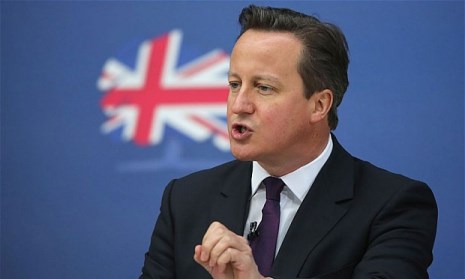Results coming through Friday showed an outcome unpredicted in opinion polls before the election, with the Conservatives showing an unexpected level of success and Labour and the Liberal Democrats left devastated in what many observers said was the biggest surprise in a general election since 1945.
Conservative Prime Minister David Cameron said in a speech after being re-elected in his constituency of Witney: "I want my party, and a government I hope to lead, to reclaim a mantle that we should never have lost -- of one nation."
The BBC’s forecast predicts that the Conservatives will win 325 seats, enough for an effective parliamentary majority.
The Conservatives had won 242 seats by early Friday morning, Labour 210, the Scottish Nationalists 55, the Liberal Democrats six and UKIP one.
Ed Miliband, the leader of the main opposition Labour Party, said: "This has clearly been a very disappointing and difficult night for the Labour party."
The updated BBC forecast also predicated the center-left Labour Party would win only 232 seats, the left-wing separatist Scottish National Party 56, the centrist Liberal Democrats 12, the right-wing Eurosceptic UKIP 12 and the left-wing Green Party one seat.
The Conservatives won seats from Labour and also the Liberal Democrats, who they entered into coalition with in 2010.
Referring to the surge of the Scottish nationalists, Miliband said: "The next government has a huge responsibility to bring our country together. What unites us is much, much more than what divides us."
Exit polls released after voting ended predicted the SNP would win 58 out of 59 seats available in Labor`s traditional Scottish heartland.
The SNP’s landslide in Scotland was clearly on Cameron’s mind.
"One nation, one United Kingdom -- that is how I hope to govern if I am fortunate enough to continue as Prime Minister,” he tweeted shortly after his re-election.
Big names in, and out
The Liberal Democrats are facing electoral wipeout with predicted losses of 45 seats.
Senior Liberal Democrat government ministers Vince Cable, Simon Hughes, Danny Alexander, David Laws and Ed Davy -- all long-standing MPs -- lost their seats.
Liberal Democrat leader Nick Clegg, who was re-elected in his constituency, hinted that he would resign as party leader later in the day.
"I will be seeking to make further remarks about the implications of this election, both for the country and for the party that I lead and my position in the Liberal Democrats when I make remarks to my colleagues in the Liberal Democrats later this morning when I return to Westminster," he said.
Former Liberal Democrat leader Charles Kennedy lost his seat to the Scottish National Party, which is on course to win almost every one of the 59 Scottish seats up for grabs.
The SNP gains have been mainly at the cost of Labour, however.
Labour Shadow Foreign Secretary Douglas Alexander, who was also in charge of Labour general election campaign, lost his seat to 20-year-old SNP student Mhairi Black, who is yet to take her final university exam.
Scottish Labour leader Jim Murphy also lost his seat to the SNP.
Kirkcaldy, the seat of former Labour Prime Minister Gordon Brown, who was not running for re-election, was also swallowed by the SNP juggernaut.
Exit polls released after voting ended predicted the SNP would win 58 out of the 59 available seats in Labor`s traditional Scottish heartland.
The party, running on a left-of-Labour and anti-austerity platform, has so far won 55 seats.
The swings were sensational.
The largest swing in any seat in the 2010 general election was 21.9 percent but, by 03.00GMT, the SNP had broken the figure 12 fold, with Labour-seat Glenrothes going to the SNP by virtue of a titanic 34.9 percent swing.
Former SNP leader Alex Salmond, who stepped down after his party lost last September’s independence referendum, was elected to the U.K. parliament.
Nicola Sturgeon, the current SNP leader, is not running in the U.K. general election, deciding to remain as a member of the Scottish Parliament.
More about:
















































